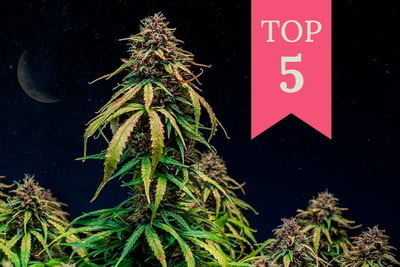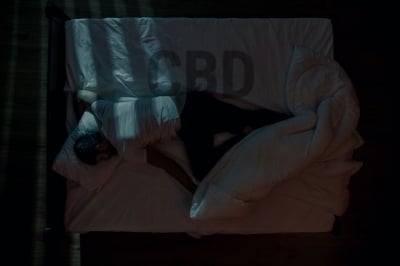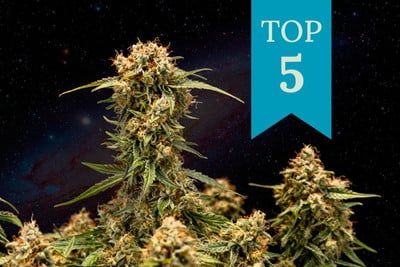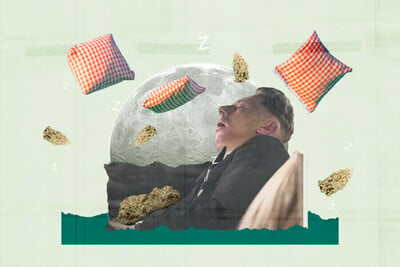.

How Does Cannabis (and CBD) Affect Dreams?
Sleeping and dreaming are essential to our health. But many cannabis users find both THC and CBD-rich weed to either inhibit or enhance their dreams. So, is your herbal nightcap really as effective as you think it is?
Contents:
Millions of people across the world use cannabis, and many of them swear that, for them, weed is a super-effective natural nightcap. But how exactly does cannabis impact our sleep, and how does it interfere with our dreams? Read on for a deep dive into the effects of cannabis (and CBD) on sleeping and dreams.
Why Do We Dream?
Dreaming is a fascinating aspect of human psychology, and it’s still the topic of countless investigations, theses, and scientific studies. Most sleep experts agree that we still don’t really understand the actual function of dreams, but we do have theories. To understand them, however, we first need to understand how we sleep.
Understanding Human Sleep
Sleep and wakefulness are essential parts of our daily, or “circadian”, rhythm. Many things can influence our sleep–wake cycle, including environmental factors like lighting and noise, but also more profound internal issues such as stress.
The human sleep cycle is naturally divided into different stages: REM (rapid eye movement) and NREM (non-rapid eye movement) sleep. The NREM stage can then be further divided into the following 3 stages:
- N1: This is the stage when we transition from wakefulness to sleep.
- N2: This is a transitional sleep stage, and happens when we pass from the stage of superficial sleep (N1) to deep sleep (N3 stage), or otherwise from the deep sleep stage (N3) to REM sleep or to the N1 stage.
-N3: Also known as slow wave sleep (SWS), this is a deeper stage of NREM; it's also the most restorative, both mentally and physically.
Humans can dream throughout any stage of sleep, but dreaming is most commonly associated with the REM stage of the cycle. Some estimates suggest that roughly 80% of dreaming occurs in the REM stage, despite the fact that we only spend about 20% of our sleeping time[1] in this stage.
NREM dreams tend to be about everyday things; REM dreams are more absurd[2], and also much easier to remember.
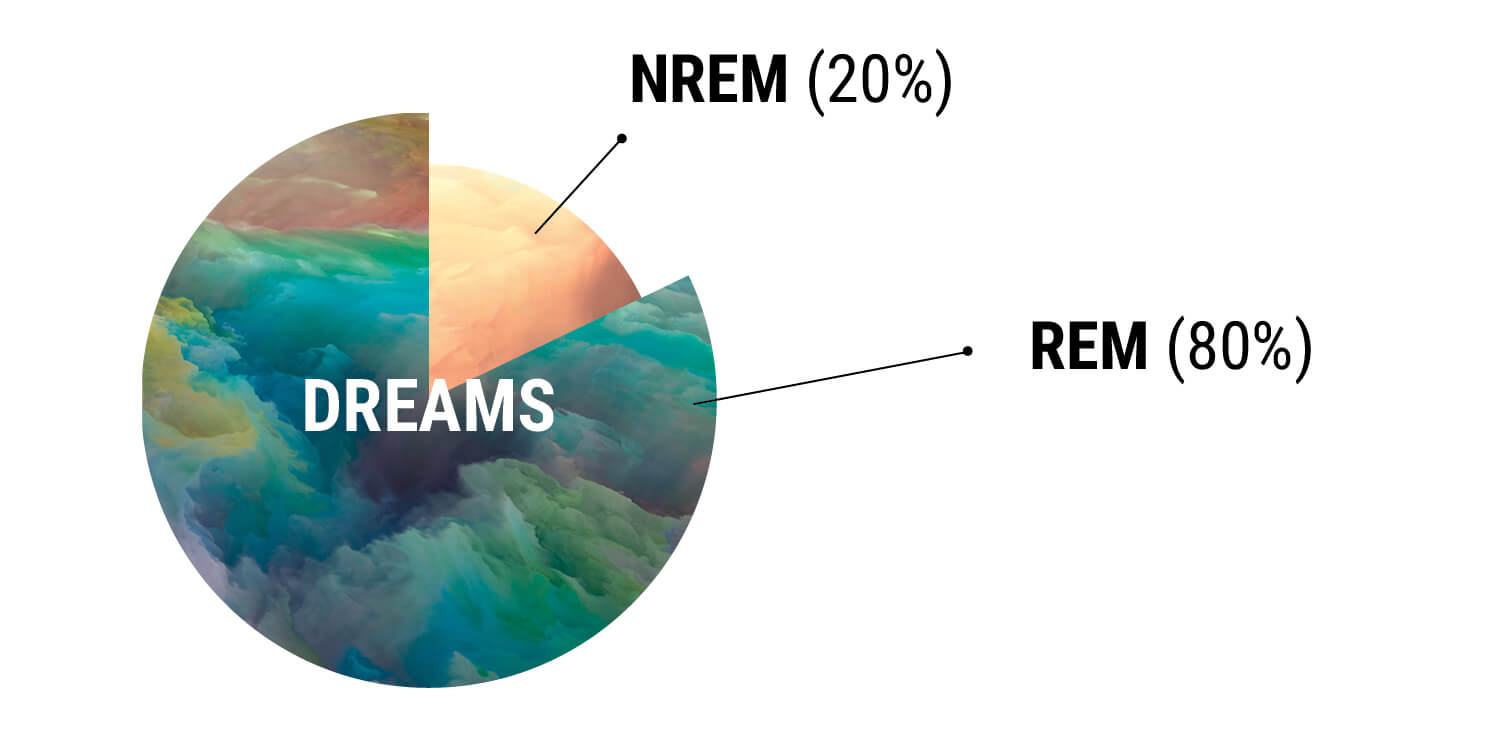
Why Is Dreaming So Important?
While wrapping your head around how and why we sleep might seem pretty straightforward, understanding why we dream is a little more complex. And while we still have no conclusive understanding of the importance of dreaming, there are some leading theories that suggest it may be just as important for our health as a solid night of shut-eye.
In a recent article[3] for Greater Good, Matthew Walker, a professor of psychology and neuroscience at the University of California, and director of the university’s Center for Human Sleep Science, likens dreaming to “overnight therapy”.
“REM-sleep dreaming appears to take the painful sting out of difficult, even traumatic, emotional episodes experienced during the day, offering emotional resolution when you awake the next morning”, writes Prof. Walker.
His own research, as well as that of other investigators, has shown that several brain areas involving memory and emotions are active during REM sleep. At the same time, REM sleep is the stage when the brain presents less noradrenergic activity,
Walker’s research has also put these findings to the test. In one study, two groups of healthy young adults were shown a set of emotion-inducing images while inside an MRI scanner. They were then shown the images again 12 hours later, with one group seeing the images the same day, and the other seeing them after an evening of sleep.
Participants who slept before seeing the images a second time reported a significantly decreased emotional response. Their brain scans from the MRI supported this response; they showed significantly reduced reactions in the amygdala, one of the brain's areas most associated with emotions. The prefrontal cortex (responsible for rational reasoning) was also more engaged in these participants.
Moreover, the study tracked each participant’s sleep during the two sessions. As they slept, Prof. Walker and his team also registered specific brain activity that triggered a drop in stress-related brain chemistry during the participants’ dream state. Based on these findings, Prof. Walker and his investigative team believe that dreaming can help humans de-escalate their emotional reactivity and sensibility.
Similar studies[4] conducted on veterans with post-traumatic stress disorder (PTSD) have also produced similar results and conclusions. Meanwhile, other research conducted by Prof. Walker and the Center for Human Sleep Science has shown that dreaming is extremely important for stimulating our creativity and problem-solving skills.
In one of his studies, Prof. Walker and his research team woke participants during both the NREM and dream stages of their sleep, and asked them to take short anagram tests; the goal was to unscramble a set of letters to form a word. When they woke participants during REM sleep, they were able to solve between 15 and 35% more tests than when woken during the NREM stage of the sleep cycle.
| REM (20%) |
| calms emotional reactivity and sensibility |
| stimulates creativity and solving-problem skills |
| lower release of noradrenaline, a key anxiety-producing chemical |
| REM (20%) |
| calms emotional reactivity and sensibility |
| stimulates creativity and solving-problem skills |
| lower release of noradrenaline, a key anxiety-producing chemical |
Enter Cannabis: How Does Weed Affect Dreaming?
So, now that we have a better understanding of how we sleep and why we might dream, let's take a look at how cannabis affects our dream cycle.
Many cannabis users report fewer dreams when regularly using cannabis. Then, when they abstain from weed, many experience an onset of very intense dreams. That’s because THC, the main intoxicating ingredient in cannabis, has been shown to suppress REM sleep.
A 2008 study[5] published in the journal Sleep suggests that heavy cannabis users spent less time in the REM stage of the sleep cycle than non-users. Now, given that the REM stage is when we do most of our dreaming, it seems possible that heavy cannabis users who get fewer hours of REM sleep would dream less.
But what exactly does that say about cannabis’ effect on sleep? Well, the answer depends.
| THC |
| suppresses REM sleep |
| sleep-promoting effect |
| sleepy (sometimes moody) feeling in the morning problem-sloving ability affected |
Many people use cannabis as a sleeping aid, and studies have shown that the endocannabinoid system plays a key role[6] in regulating how well, and how long, we sleep. Anecdotal evidence from cannabis users with sleeping issues suggests that certain types of cannabis may impact the amount of time it takes us to fall asleep (which sleep experts call “sleep latency”), as well as alter our behaviour when we wake up.
A 2004 study[7], for example, details the effects of different doses of THC, and THC + CBD, on the sleep–wake cycle of healthy young adults. The study found that THC may have a sleep-promoting effect, making it easier for participants to fall asleep, but also leaving them feeling sleepy (and sometimes moody) in the morning—probably due the NREM stage suppression—as well as affecting their ability to complete certain problem-solving tasks.
The study also noted that participants given THC + CBD spent less time in stage 3 REM sleep. A larger dose of THC + CBD, however, had a certain waking effect, increasing awake activity during sleep and counteracting the residual soporific effects of higher THC doses. Therefore, whether cannabis has a negative or positive effect on sleep really comes down to the individual, other substances in the herb, and the concentration of cannabinoids they are using. So, initially, one may deduce that for someone who struggles to fall or stay asleep, the sleep-promoting effects of THC may be beneficial. Someone who needs to be alert very early in the morning, on the other hand, could initially benefit from CBD-rich cannabis varieties instead. However, caution is always recommended.
| THC | CBD+ THC |
| suppresses REM sleep | increases awake activity during sleep |
| sleep-promoting effect | counteracts residual soporific effects of higher THC doses |
| sleepy (sometimes moody) feeling in the morning problem-sloving ability affected |
| CBD + THC |
| increases awake activity during sleep |
| counteracts residual soporific effects of higher THC doses |
What’s REM Rebound?
When regular cannabis users abstain from weed, they often claim to experience a sudden onset of very vivid dreams. These symptoms then dissipate once they start using cannabis again. This may be due to a phenomenon sleep experts call “REM rebound”[8], and it’s basically your body catching up on the REM sleep it’s been missing.
REM rebound doesn’t just happen when we smoke cannabis; it also happens when we drink. Alcohol can reduce sleep latency and suppress REM sleep, much like weed. When you hit the hay after a night of drinking, you’ll fall asleep faster and likely not dream for the first half of the night. Then, once your body has metabolised the alcohol in your system, you’ll experience REM rebound. This is why many people have strange dreams after a night of partying.
Is It Good To Miss Out on Dreaming?
As we saw earlier, there are very solid reasons why you wouldn’t want to miss out on REM sleep. In fact, depriving someone of REM sleep can lead to mood problems, cognitive dysfunction, and even impact our liver function, according to research[9] by Jordan Tishler, President and CEO of the Association of Cannabis Specialists, and Instructor of Medicine at Harvard Medical School. But, in some cases, suppressing REM sleep may actually be beneficial.
Experiencing severely traumatic incidents, such as acts of violence, severe accidents, or abuse, can cause post-traumatic stress disorder, a condition marked by anxiety, flashbacks, nightmares, and a bunch of other mental health symptoms.
For people with PTSD, suppressing REM sleep may be very beneficial. Studies[10] have shown, for example, that people with PTSD often experience sleep disturbances, nightmares, and fragmented or interrupted REM sleep.
Other research suggests that this could be because people with PTSD produce the stress molecule noradrenaline during their REM sleep cycle. When treated with prazosin (a drug that inhibits the production of noradrenaline), for example, PTSD patients in this 2003 study[11] experienced fewer nightmares and PTSD-related sleep disturbances than those treated with a placebo.
Suppressing REM sleep using evidence-based medicines has also been studied[12] in relation to conditions like insomnia and nightmares among children/teens. Therefore, paying attention to what we already know, some cannabis derivates could be useful against PTSD; however, more investigations are still required.
What About CBD? How Does Cannabidiol Affect Dreams?
A wide variety of studies have looked at how cannabidiol might affect the human sleep cycle. The results are mixed, meaning we still don’t entirely know how CBD impacts sleep. This 2017 review[13] of cannabinoids and their effect on sleep, for example, argues that CBD may both increase and decrease the onset of REM sleep, depending on the dose.
While anecdotal evidence might not be considered as scientifically sound as clinical trials, many people find that taking CBD can alter the way they sleep, and the way they experience dreams. For example, many CBD users claim to experience more lucid and vivid dreams. Unfortunately, there’s not enough clinical evidence to provide us with a solid understanding of how CBD affects dreaming.
Does CBD Cause Nightmares and Bad Dreams?
The results of some internet polls[14] suggest that certain CBD users experience bad dreams after taking the cannabinoid. However, the same poll also found that, for some, CBD can enhance vivid or lucid dreaming, or even completely suppress dreaming. Unfortunately, here too there is no solid answer to the question at hand.
The Gray Area of Cannabis and Dreams: What Does the Future Hold?
Unfortunately, like with most areas of cannabis research, there’s still a lot we don’t know about the effects of cannabis and CBD on sleep and dreams. As we saw in this post, both THC and CBD may affect REM sleep, either by promoting or inhibiting it. Both results could be beneficial, depending on the needs of the individual. Still, more and more information is finding its way to the surface, so we may soon see some major advancements regarding cannabinoids and sleep. Watch this space!
- Neuroscience for Kids - Sleep https://faculty.washington.edu
- Ultradian, Circadian, and SleepDependent Features of Dreaming http://www.dreamscience.ca
- Why Your Brain Needs to Dream | Greater Good https://greatergood.berkeley.edu
- Psychiatry Online http://ajp.psychiatryonline.org
- Sleep Disturbance in Heavy Marijuana Users https://www.ncbi.nlm.nih.gov
- Endocannabinoid Signaling Regulates Sleep Stability - PubMed https://www.ncbi.nlm.nih.gov
- Effect of Delta-9-tetrahydrocannabinol and cannabidiol on nocturnal sleep and early-morning behavior in young adults - PubMed https://pubmed.ncbi.nlm.nih.gov
- Strange but True: Less Sleep Means More Dreams - Scientific American https://www.scientificamerican.com
- Treating Insomnia and Sleep Disorders with Medical Marijuana https://inhalemd.com
- Sleep and REM sleep disturbance in the pathophysiology of PTSD: the role of extinction memory https://www.ncbi.nlm.nih.gov
- Psychiatry Online http://ajp.psychiatryonline.org
- Prazosin in Children and Adolescents With Posttraumatic Stress Disorder Who Have Nightmares: A Systematic Review - PubMed https://www.ncbi.nlm.nih.gov
- Cannabis, Cannabinoids, and Sleep: a Review of the Literature | SpringerLink https://link.springer.com
- A Potential Sleep Side Effect of CBD: CBD Nightmares https://futurism.com


























